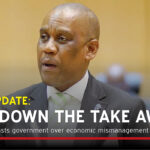Economists fear that the fiscal measures put in place by government to lessen the impact of Covid-19 on the economy are significantly less than what is needed.
The economic review by Econsult Botswana for the first quarter of the year notes that the fiscal measures installed to cushion the country’s economy is extremely low by international standards.
The amount is estimated to be around P4 billion or 2 percent of GDP, which Dr. Keith Jefferis and his colleagues, Sethunya Sejoe and Kitso Mokhurutshi say is a relatively small injection by international standards and may need to be topped up in due course.
Other measures economists say require consideration is the informal sector and small and micro enterprises that do not meet tax registration eligibility requirements for access to wage subsidies as well as the issue of rent.
Government has reserved P10 million for the informal sector, an amount which is said to be low, especially considering how vast the sector is.
Although solid data on the damage caused to the economy by the pandemic is only expected to be available in three months time, Econsult economists say for other countries, there are fairly consistent estimates of economic activity being reduced by 30-60 percent in the short-term during periods of strict lockdowns.
The decline in Botswana’s GDP for the month of April is expected to be around 50 percent. This is only the short-term impact with the longer-term impact expected to rely on a number of factors.
These factors include developments in the global economy, recovery in the diamond industry, the length of time it takes for international travel to resume, the duration of the domestic lockdown and the restrictions imposed under the State of Public Emergency.

















